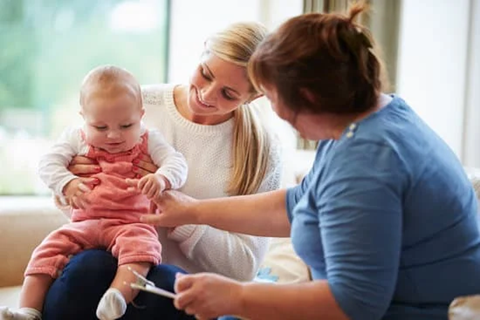About Us
Providing support & information to families with children aged 0-5
What is a health visitor?
A health visitor is a qualified nurse or midwife who has completed specialist training in children and family health. They offer support and advice regarding the wellbeing of your child until the school years.

What care does your health visitor provide?
Your health visitor will provide you with specialist up-to-date advice and support on many health and wellbeing topics such as:
- Your own support after the birth of your baby
- Child development – sleep, speech and language, behaviour and school readiness
- Assistance with the various aspects of being a parent
- Providing information on childhood immunisations
- Breastfeeding/formula feeding
- Weaning
- Promoting oral health
- Safety – reducing accidents
- Minor ailments
- Building community connections
- Promoting good mental health and wellbeing of the whole family
What can I ask my health visitor?
Please feel free to ask your health visitor and questions you have at any time. Health visiting teams spend a lot of time on home visits but all health visiting teams have to answer phones and will aim to get back to you as soon as possible. If you have any concerns and can not get in touch with your health visitor immediately, contact your GP surgery or NHS24 on 111.
When will I see my health visitor?
Babies born from May 2017 will be on the new Universal Health Visiting Pathway
Pre-Birth
Antenatal Letter

Antenatal Contact
Home Visit 32-34 weeks

New Baby Home Visit
Notification Visit 11-14 days

Follow Up Visits
2x Home Visit 3-5 weeks

6-8 Week Review
Home Visit 6-8 weeks

3 Month Review
Home Visit around 3 months

4 Month Review
Home Visit around 4 months

8 Month Review
Home Visit around 8 months

13-15 Month Review
Home Visit between 13-15 months

27-30 Month Review
Home Visit between 27-30 months

4-5 Year Review
Home Visit between 4-5 years














